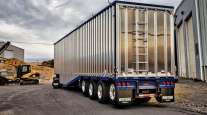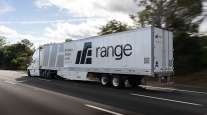U.S., Canada Truckers Eye Cabotage Change to Liberalize Movement of Empty Trailers
This story appears in the July 15 print edition of Transport Topics.
U.S. and Canadian trucking officials said an agreement allowing truckers to move empty trailers within the other country could result from their governments’ efforts to improve cross-border trade.
Trailer repositioning is currently banned in both countries for drivers who work for a foreign carrier. The United States and Canada consider it cabotage, the domestic commercial movement of people or goods by a foreign carrier, which is illegal.
Canadian government officials have signaled a willingness to change the rule as it applies to empty trailers, provided the United States agrees to it.
“If we want an efficient and competitive supply chain in North America, then these are precisely the sort of legacy, out-of-date rules that need to be changed,” David Bradley, CEO of the Canadian Trucking Alliance, said in a statement. “We’re not talking about the point-to-point movement of goods but simply the repositioning of empty foreign trailers involved in the international stream of commerce.”
Foreign truck drivers currently can move trailers only if they are coming into or out of the country.
But a June 26 report from the binational Beyond the Border initiative has given hope to the CTA and American Trucking Associations that repositioning rules could change soon, representatives said.
In that joint report, the United States and Canada agreed to “review policies related to the movement and treatment of foreign drivers and related equipment to ensure maximum legally permissible alignment of policy with evolution in the cross-border trucking industry.”
CTA said that statement signals a willingness by both countries to change how it interprets cabotage rules for empty trailers.
Under the North American Free Trade Agreement, or Nafta, the United States and Canada both defined cabotage as commercial movement of goods and passengers.
Margaret Irwin, ATA’s director of cross-border operations, agreed that a rule change makes sense.
“We’re saying it’s not cabotage, because the definition of cabotage, as explained in the regulation, is moving people and goods,” she said. “And, under Nafta, trailers and tractors are not goods.”
The current trailer rules are inconvenient and do not align with industry practices, the trucking groups said. They create particular problems in the grocery industry, Irwin said.
“A lot of these importers want the trucker to leave the trailer in the yard, so they can unload it at their leisure,” she said. The driver can’t then move the empty trailer to another spot in the same yard.
“The rules simply don’t make sense in the 21st century,” Bradley said. “The way the economy works has obviously changed.”
Industry representatives have not asked for further relaxation of cabotage rules, nor have they asked for similar changes in Mexico.
Bill Brown, a spokesman for Citizenship and Immigration Canada, said his agency has supported the trucking groups but wants to be sure that U.S. officials would do the same.
Jason Kenney, Canada’s minister of citizenship and immigration, sent a letter to CTA in June outlining the agency’s position: “I can confirm, once again, that if U.S. immigration law is amended to lift current restrictions which have a negative effect on Canadian drivers, Canada is prepared to provide reciprocal treatment to American drivers,” he said.
U.S. officials have not moved forward, and the Beyond the Border report is the first indication that the United States is open to the proposal, CTA said.
The U.S. Department of Homeland Security did not respond to requests for comment.




